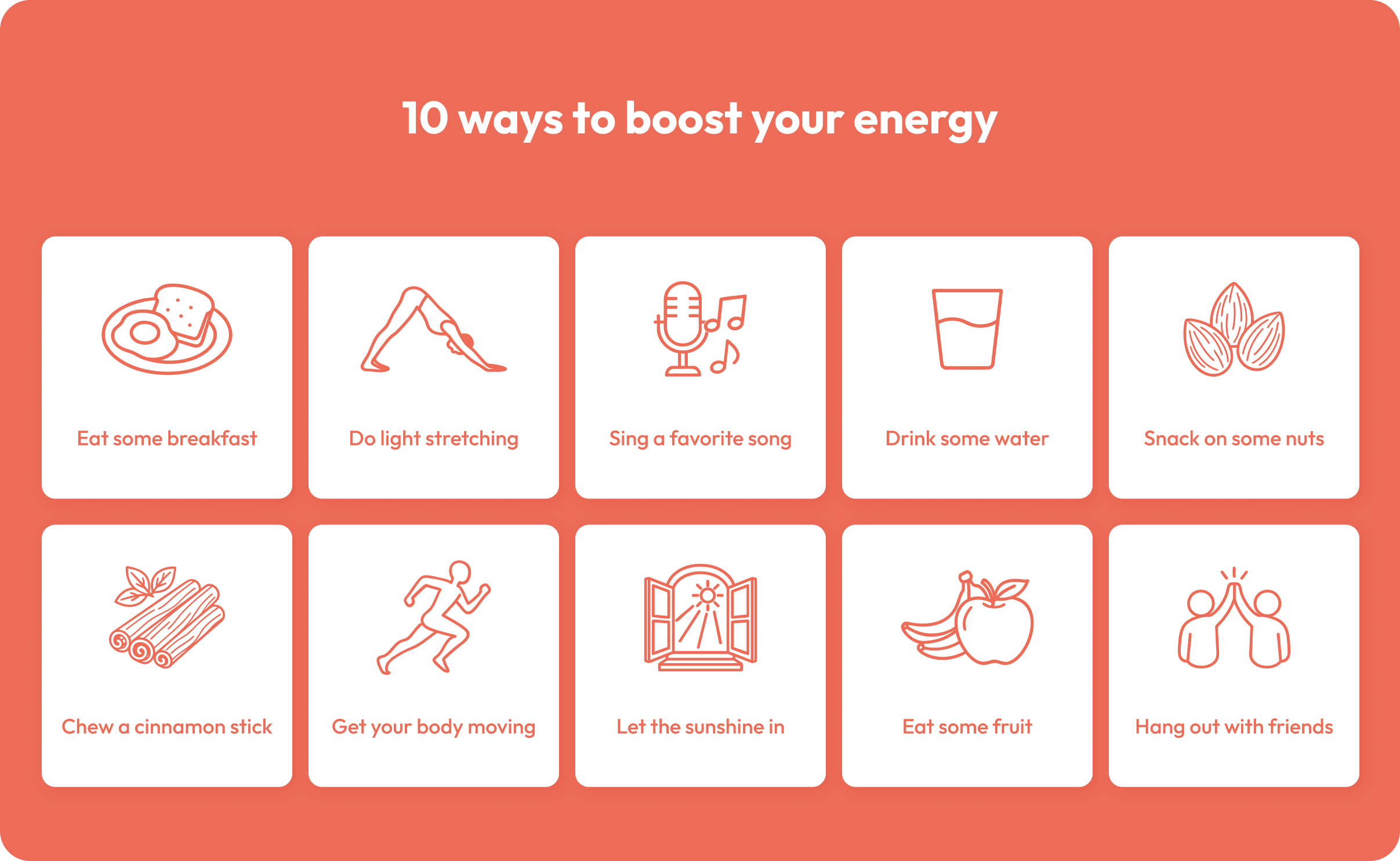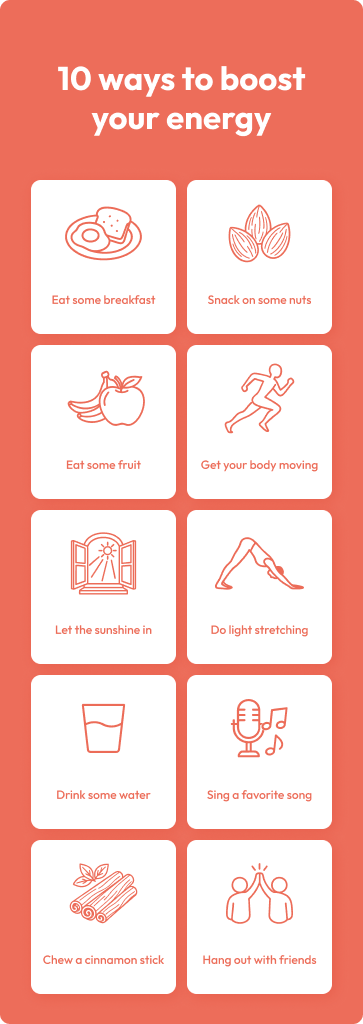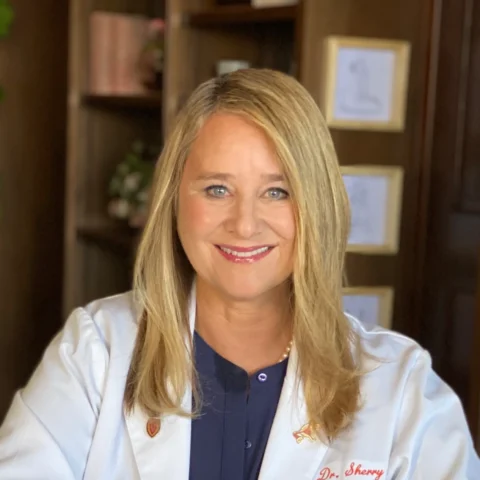Low energy: Causes, symptoms, & treatments
If you’ve been feeling unusually drained lately, like no amount of sleep, coffee, or rest fully recharges you, it’s easy to wonder what’s going on. Maybe you’re still keeping up with work or hanging out with friends, but everything feels just a little harder than it used to. Many women in their 30s, 40s, and 50s notice that even with enough rest, their energy just isn’t what it used to be.
What you may not realize is that these shifts can sometimes be connected to hormonal changes during perimenopause or menopause. As estrogen and progesterone levels fluctuate, they affect how your body uses energy and how your metabolism and mood function.
We’ll walk through what causes the dip in low energy, how to tell when hormones are influencing these feelings, and the most effective ways to restore balance, so you’re not feeling like you’re operating on a low battery.
What causes low energy during menopause and perimenopause
As estrogen and progesterone levels begin to fluctuate, several systems in your body that influence and regulate energy can fall out of sync.
One of the first changes many women notice is their quality of sleep. Given the fluctuations in hormones, your body may be reacting in ways that disrupt your sleeping patterns, from night sweats waking you to restlessness, insomnia, and even stress.
Dr. Sheryl Ross (Dr. Sherry), Chief Medical Officer of Women’s Health here at QuickMD, explains, “The majority of menopausal women experience insomnia, snoring, and bouts of sleep apnea. Insomnia ultimately leads to daytime fatigue, which is disruptive and a cause of concern.”
These hormonal changes also affect brain chemistry. Estrogen interacts with neurotransmitters like serotonin and dopamine, which influence and support focus, motivation, and mood. When estrogen dips, it’s common to feel slower, less driven, or mentally foggy.
Dr. Sherry adds, “Menopausal symptoms occur as a result of low estrogen levels, which can also cause a drop in serotonin and dopamine levels, leading to cognitive changes, including memory loss, poor concentration, brain fog, and depression. Normal aging also contributes to memory and brain fog issues, so the overlap makes these symptoms seem more pronounced.”
At the same time, your body’s temperature regulation can become more sensitive, where you may feel too warm at night or chilled during the day, making your system work harder to maintain comfort, which drains your energy.
And because menopause affects metabolism and insulin sensitivity, your body might not use food as efficiently for fuel. That’s why steady meals and gentle movement matter more than ever. They help keep your energy even throughout the day.
Altogether, these changes can make you feel like you’re functioning at max capacity, where you’re dragging and lacking motivation because everything seemingly takes a bit more effort than it used to.
What low energy feels like
Low energy isn’t always about sleepiness. It’s more like running on a low battery. You can still function, but you’re opening new tabs more slowly, and loading pages feels like it requires more effort.
You might notice:
- You get through your day, but feel slower or less focused.
- You still want to be social or active, but your drive just isn’t there.
- You feel emotionally “flat” or less motivated.
- You’re getting enough sleep, but still wake up tired.
Low energy can also make other menopause symptoms feel more intense, like brain fog, irritability, and mood swings, which can create an unpleasant cycle that seems hard to break.
So… when is it menopause fatigue?
Both show up during menopause and perimenopause, but they’re not exactly the same thing.
You’re experiencing menopause fatigue when:
- You’re exhausted most days
- Rest doesn’t help much
- It’s tied to poor sleep from night sweats/hot flashes
- You also have brain fog or can’t focus
You’re experiencing low energy when:
- You’re getting by but feel slowed down
- You can still function at work/home
- Motivation is low, not just sleepiness
- A good sleep or a good day improves it
That distinction matters because your doctor may approach them differently. Fatigue may prompt a deeper look at things like thyroid levels, anemia, or sleep apnea, while low energy often responds to lifestyle support, stress management, and hormonal balance.
How to boost energy during menopause
Menopause hormone therapy (MHT)
Menopause hormone therapy (MHT) can help restore more consistent hormone levels. Studies show estrogen supports mitochondrial function (your cells’ “energetic pioneers”) and helps regulate brain chemistry tied to focus and motivation. Many women who start MHT notice their energy steadies, their focus improves, and daily activities feel less taxing.
MHT comes in several forms, from pills to patches to gels or sprays. Your doctor can help determine what’s safest and most effective based on your health history and preferences.
Nonhormonal medication treatment
If MHT isn’t right for you, there are nonhormonal treatments that can indirectly support your energy by improving sleep, mood, or focus (the systems that drain energy most when disrupted).
Sleep-supportive medications can help if your energy dips because of restless nights or hot flash interruptions. Getting deeper, more restorative rest helps your body recharge.
Low-dose antidepressants (SSRIs or SNRIs) can also help balance neurotransmitters like serotonin and norepinephrine, improving focus and motivation even if you’re not clinically depressed.
Your doctor can help you identify what’s really behind your low energy, whether it’s disrupted sleep, hormonal imbalance, or mood, and create a personalized care plan that helps you relieve what you’re going through.


Lifestyle changes to combat low energy
You can’t control every hormonal shift, but you can support your body’s natural energy systems by engaging in small lifestyle changes.
Move your body regularly
Exercise is one of the best natural energy boosters. Movement strengthens your muscles, improves circulation, and boosts your body’s ability to attune with energy efficiently. Even a short walk, light yoga, or a few minutes of strength training can help reset your metabolism and improve sleep quality.
Dr. Sherry shares, “Regular exercise also improves your energy, mood and emotional stability. Exercise makes you feel more confident and helps ease the stress when dealing with menopausal symptoms. Sleep patterns show improvement as well.”
Support your metabolism
When estrogen declines, metabolism naturally slows. Aim for balanced meals that combine lean protein, fiber, and healthy fats to keep your blood sugar steady.
Hydration matters too. Small, steady sips throughout the day can prevent the dips that mimic fatigue. Dr. Sherry adds, “A good goal is to never feel thirsty, as thirst is your body’s way of telling you that you need more fluid. Dehydration requires your body to work harder to perform even the most basic functions, which can lead to low energy and fatigue.”
Prioritize rest
Energy depends on quality sleep, not just the number of hours. Try a consistent bedtime, keep your room cool, and limit screen time before bed. If night sweats or hot flashes interfere with rest, cooling bedding or moisture-wicking pajamas can make a real difference.
Natural remedies for low energy during menopause
Some supplements and herbal options may support your energy and overall sense of balance when used safely alongside other treatments. Always talk with your doctor before trying supplements, especially if you’re taking other medications.
Nutritional and herbal support
- Magnesium glycinate helps with muscle relaxation and supports deeper sleep, which naturally improves daytime energy.
- Omega-3 fatty acids (found in fish oil or algae) can support brain function and mood, which are closely tied to motivation and focus.
- Ginseng and maca root have been studied for improving stamina and mental clarity in menopausal women, though results vary.
- Vitamin D and B12 deficiencies are common in midlife and can directly cause low energy. Testing and supplementation may help restore balance.
Self-care practices
Stress is one of the biggest drains on energy. Mindfulness, meditation, or even a few minutes of slow breathing can help your body recharge and regulate itself. Over time, these small resets can make your energy feel steadier across the day.
Dr. Sherry emphasizes that you should “Prioritize self-care activities like exercise, eating a balanced diet, and getting enough sleep. These can help improve your overall well-being and potentially boost your mood, energy, and sex drive.”
Feeling worn out or running on empty? See how hormone therapy can help restore your energy levels.
You deserve to feel energized and in control of your body. QuickMD doctors can help restore hormonal balance to support steady energy, focus, and overall well-being.
We just launched our Menopause Hormone Therapy Membership in select states, and your first month’s on us. You’ll get to meet with a doctor, ask all your questions, and see if treatment might help.
If you love it and want to keep going, it’s $ 79/month after that, with special member pricing on medication and regular access to your doctor. And if you decide it’s not for you – that’s totally fine too. Get started by booking your free visit now.

